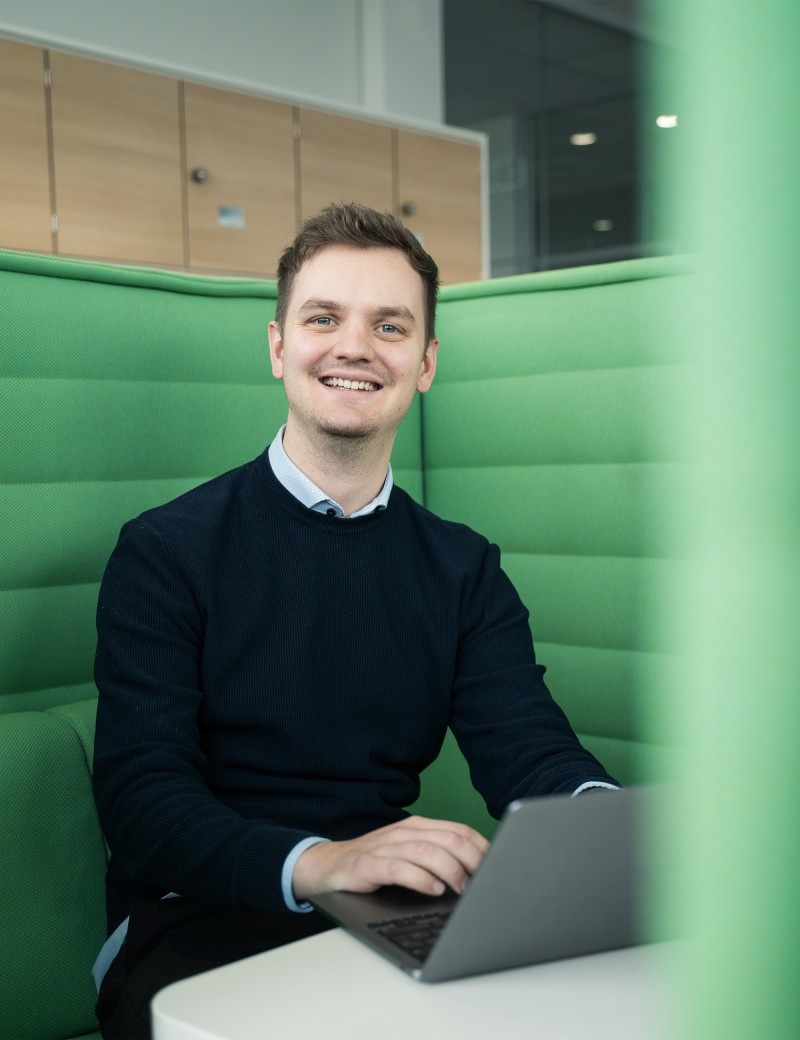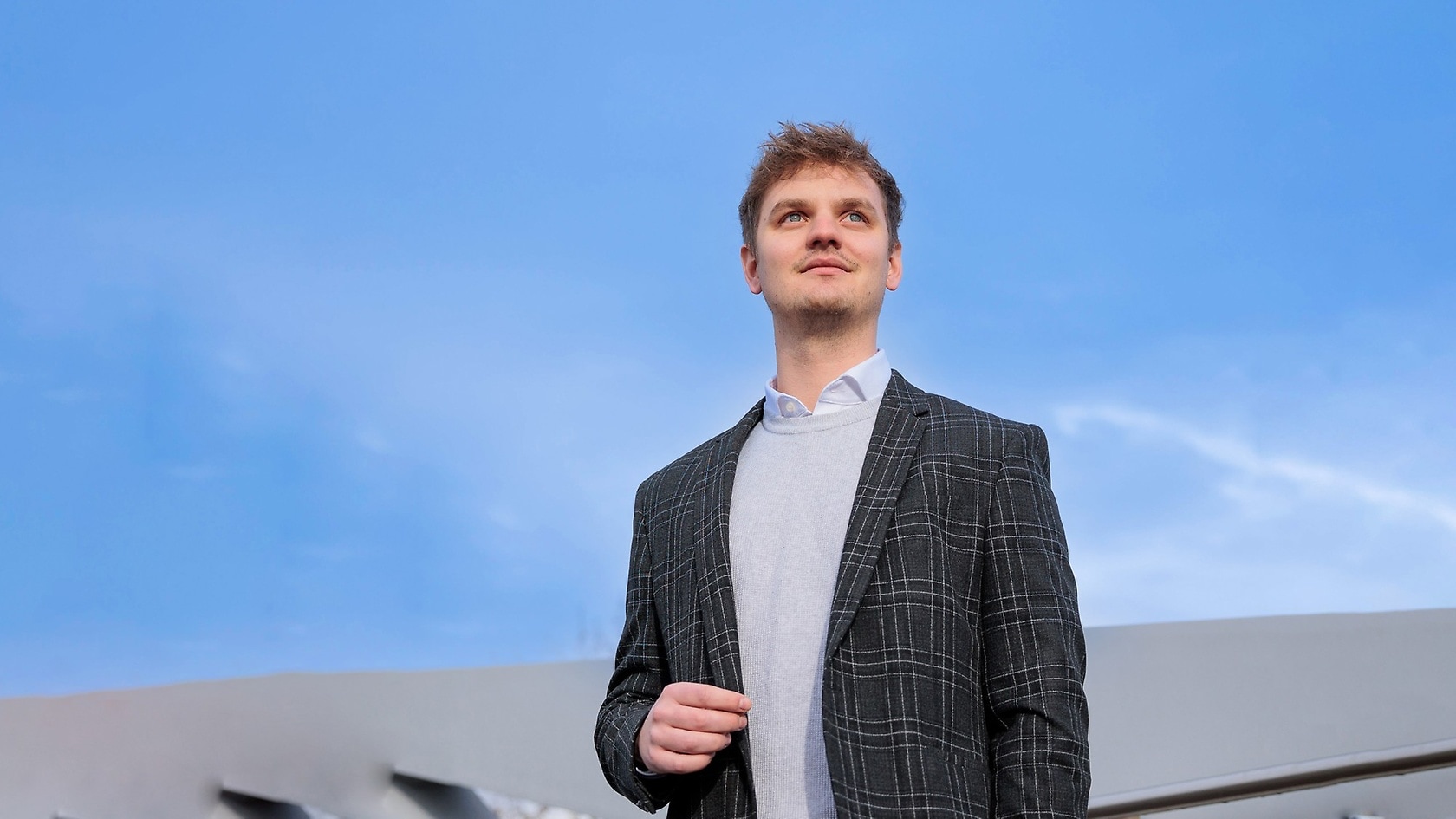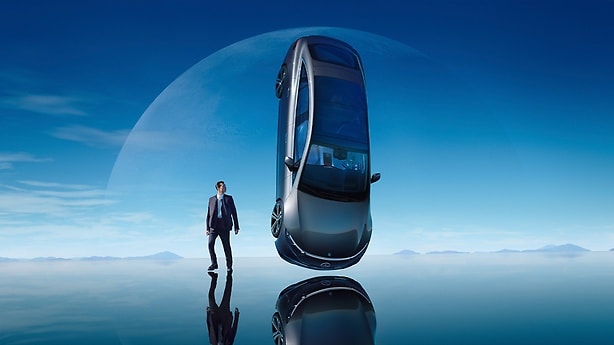Advancing digitalisation as a data translator.
Tristan Flüchter first joined Mercedes-Benz in HR marketing after completing his dual business administration studies. His interest in the field of business analytics then took him to Dublin for a master programme. Since graduating, he has been working at Mercedes-Benz Management Consulting (MBMC), the internal strategy consulting team for Mercedes-Benz AG. His job is to use data-based solutions to advance digitalisation at the company. In his interview, Tristan discusses further development, logic, diversity and his hobby under the stars.
Hello, Tristan. You are a Senior Digital Consultant at MBMC and are currently assisting Procurement with the digitalisation of their processes. What do you do specifically?
In our current project, we are working on creating more transparency in our supply chain, which means gathering data where no underlying data existed beforehand. We then interpret these data in a cloud solution, data compliant, and provide it as dashboards to management as well as many other internal stakeholders in Procurement. This helps them make even better decisions. Projects of this kind typically last four months. Generally speaking, there are three types of applications in the field of data analysis: descriptive analysis, such as the current project, which interprets information to yield more knowledge and a better basis for decision-making; predictive analysis; and prescriptive analysis with specific problem-solving measures. For the most part, these applications build on the understanding of the data that was previously acquired.

Could you use an example to explain how beneficial the usage of data analysis can be?
We have a great deal of internal data that are generated or gathered and stored throughout the supply chain. In our project, we merge these data sources to allow us to interpret details about production needs even better, for instance. This enables individual units to tap into a much broader dataset and to ultimately make more informed decisions. For example, if the supply manager knows of production needs at the Sindelfingen plant early on, he can better anticipate which vehicles should have delivery priority there.
You are responsible for issues involving digitalisation in the Digital Accelerators unit. Are you part of a set team?
Only for the current project – not generally. We form project teams three times each year. That enables my colleagues and me to take turns working with each other. As part of MBMC, Digital Accelerators focus on data-based problem solving. As such, teams are most often made up of a data scientist, a digital consultant and a project manager. A strategy consultant is also included for comprehensive projects as needed. As a digital consultant, I bridge the gap between what the internal customer wants and what is feasible with the underlying data. In turn, the data scientist considers how the data architecture needs to be set up for it to be useful and develops complex models based on this. My former mentor said my job title actually is “data translator”. I show our customers how data can assist their work and I listen to their requests. Because even the coolest tool doesn't help if no one uses it.
Do you think agility and diversity are crucial criteria for successful collaboration?
Absolutely. The dynamic projects alone make us agile. Achieving success in short timeframes only happens with very agile team structure. We work very efficiently, especially in sprints with the developer teams. Diversity is definitely a success factor. At MBMC, we have colleagues with diverse profiles. For instance, we are very international and career changers like me are quite common. Since the team setup can change every time, it never gets boring, either. The different personalities, perspectives and challenges create a great work environment!
You joined Mercedes-Benz as a dual student in business studies with a concentration in international business right after your school graduation. What brought you to data analysis?
After my degree, I started to work in the Employer Branding team, where I frequently got to talk with data scientists, data analysts and developers during marketing initiatives. I was also involved with our internal competence centre for advanced analytics. In doing so, I was excited by what I learned about the opportunities that data offer. After seven years of employment, I took a year of leave to obtain my master's degree in Business Analytics in Dublin. I kept in touch with the company, found a mentor and then applied to work at Mercedes-Benz Management Consulting.

And what was the decisive factor for you to study in Ireland?
One half of my previous degree in international business was in English, and I spent part of the business studies programme in Milton Keynes, England, and Edinburgh, Scotland. I then wanted to go back and spend my entire master's programme in a country where English is the native language. Ireland was ranked high and was more affordable pricewise than the UK (laughs), so Dublin it was.
What was it like for you to suddenly be a student again after years of employment?
Living as a full-time student was new to me. It was odd to spend longer than three months studying and to have to create my own structure. But I thought it was cool to see things from an external perspective again and to learn something outside my field – even if the programme was rather challenging, particularly at the end. Since the programme takes just one year, I didn't fall behind back home in Germany.
Do you only work at the Sindelfingen site, or do you also serve your customers elsewhere?
Many of our internal customers are located in and around Sindelfingen. So we often meet with customers on-site in Vaihingen or Untertürkheim. However, I haven't participated in many on-site meetings so far. I usually take part online.
Do you like the hybrid work model?
I like being able to work remotely, but I actually really enjoy the office. The project team jointly decides how often we want to meet in the office. We meet every other week for our current project, for instance. However, other teams primarily work on-site because it suits them better. Having the flexibility to work where you want to is great, and it saves me the commute at times.
What does your job mean for you and your prospects at Mercedes-Benz?
It is important to me that my work makes sense. I lose interest if I notice that my job doesn't produce anything special. In my current job, I often realise that what we do has a big impact on the company. We support the corporate strategy, clear paths for digitalisation and create new opportunities for the specialist units. And we combine these paths with value. That's fulfilling for me. At the same time, I'm personally responsible for my topics, receive periodic feedback and am thus continuously developing. I enjoy learning a great deal, broadening my horizons and getting up to speed on new topics. There's no better place for me because I'm able to contribute something meaningful along the supply chain each trimester. That also helps generate ever greater awareness of Mercedes-Benz's overall strategy. And in turn, that's valuable for my future career path.
What makes working at Mercedes-Benz special for you?
I think it's awesome to play a part in a product that can later be seen on the road. And Mercedes-Benz Group offers me the chance to go to different units, to learn new things and to prove myself. Theoretically, I can work for this employer my whole life, learn about new topics and, ultimately, not see a single unit twice. That's what makes working at Mercedes-Benz so special for me.
One of your hobbies is astrophotography. Have you taken any particularly lucky shots with your camera?
Funnily enough, that's how I feel about most of my pictures (smirks). At any rate, I've already reached my goal of crafting a particularly stunning picture of the Andromeda Galaxy – the largest body in the night sky. What makes astrophotography challenging is that the pictures are relatively faint and the subject is quickly moving away, so you have to continuously track it with the telescope. It's a hobby for people with patience – things often go wrong and it takes a long time to produce something usable. But I enjoy spending time on my own under the stars – it slows things down and gives you new perspectives. No matter what we consider to be important down here, there's much that exists out there that we don't even know about.
Tristan Flüchter in convinced that our future will be increasingly connected: cars, roads, traffic lights and buildings send and receive data, communicate with each other and make our life "smart". It's no wonder that he was appointed co-author of an academic paper on mobility in the context of smart cities during his master's programme in Business Analytics from August 2021 to August 2022. He is a native of Essen, Germany, who now lives in Göttelfingen and appreciates that the rural setting in the town of 900 allows him to pursue his hobby of astrophotography. The space atlas he was gifted at the age of six sparked his fascination with far-off galaxies. When the NEOWISE comet was visible in 2020, he even managed to convince his mother to go to the countryside with him at 4:00 a.m. to seize the once-in-a-lifetime opportunity to see the heavenly body with his own eyes.

